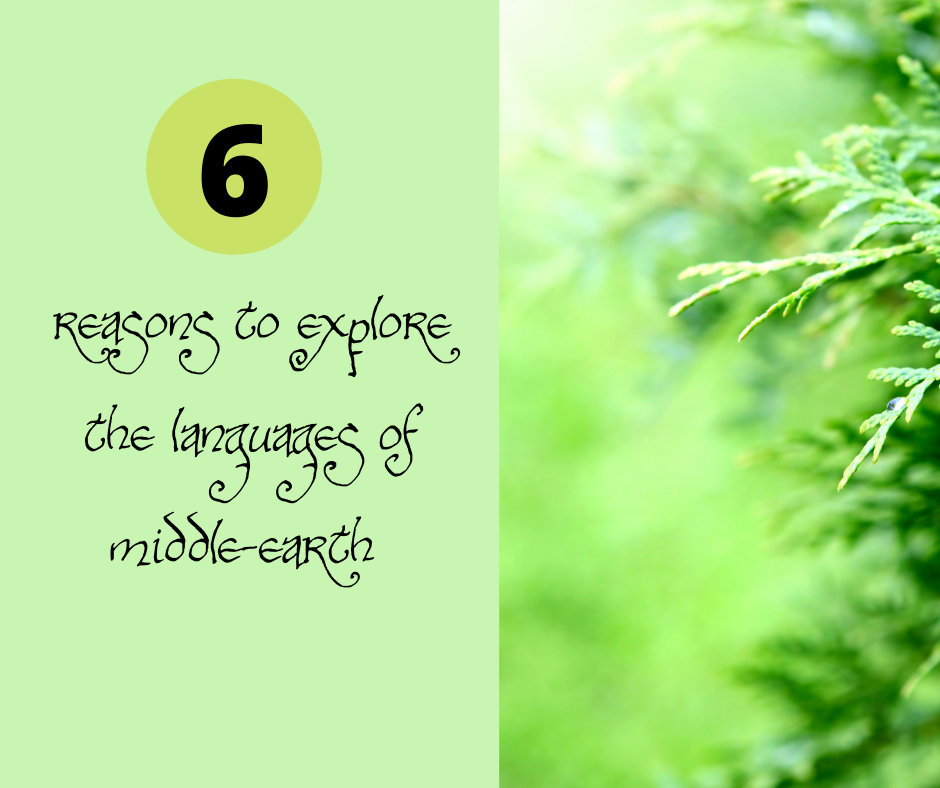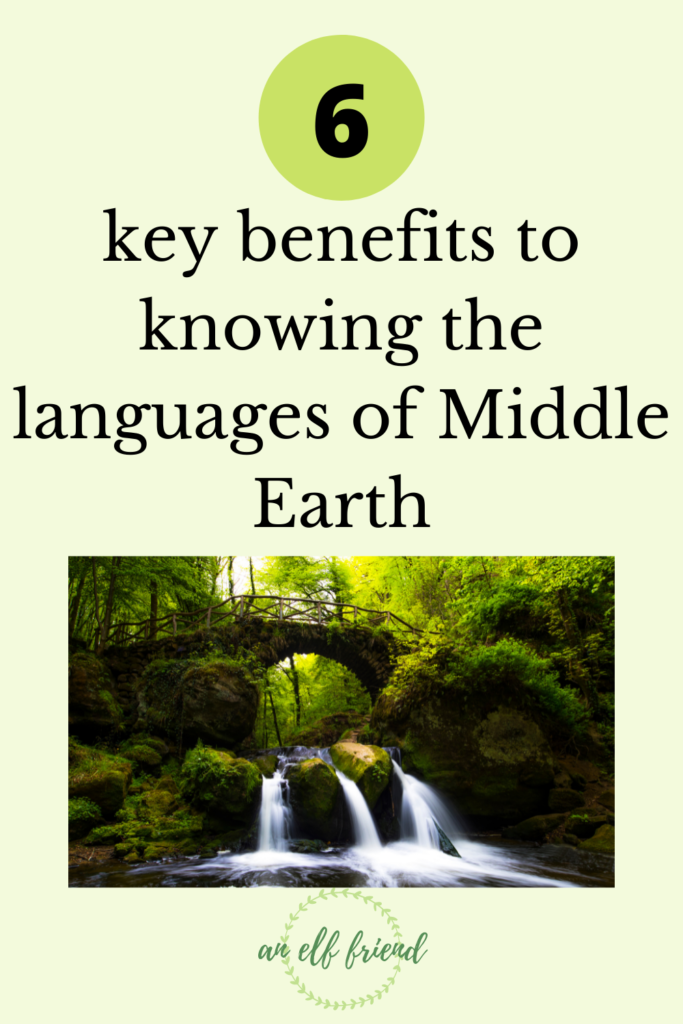

Do you ever wonder what the “cool terms” or “weird terms” stand for (depending on your stance)? They’re part of the Languages of Middle Earth – languages that were invented by JRR Tolkien and used throughout his works in Middle Earth. Picking up such languages is an acquired skill much like any other language that is to be picked up. It also provides many benefits, and is exciting and fun!
But why, you ask?
Of course, we’re not going to converse in these Elvish terms on a day-to-day basis (unless you want to!). And obviously, the only way we can meet an elf is by reading the books over and over, am I right?

So what’s the deal with those pesky words? Aside from them being the initial inspiration from Tolkien himself, what’s the point of learning the Languages of Middle Earth if we’re not going to use them, you ask?
Not so fast…
There are so many benefits that you will experience by knowing the Middle Earth Languages – I could go on and on but here are just a few of my favorites! Many of which are merely related to learning a new language in general, but a lot of them also have to do with understanding the world of Tolkien’s Middle Earth better.
They are:
- To connect with the characters and deepen such ties
- To improve your own language(s) and your vocabulary
- Read more efficiently and fully enjoy the works of Middle Earth
- Increases your memory and brain flexibility
- Boosts your mood
- Improves your creativity and problem solving
My experience with Tolkien’s works and languages of Middle Earth
In my later years in college, I heard from a friend that Tolkien was a wonderful and Catholic author. I had no idea. I was just starting to “take-up” reading again (after a long hiatus due to school) and gotten into reading a lot of C.S. Lewis (who happens to be a dear friend of Tolkien’s, and wrote Narnia in addition to some other books on Christianity). I might’ve heard about Lord of the Rings, merely from word of mouth, but I didn’t know anything about Tolkien or his religious history.
Then one summer about a year later, I went back to my local library and gotten into audiobooks. I just came out of the hardest semester of my life, and could use a little lull from it – which I decided I was going to take through reading in general.
I was also losing touch with my faith. I was still doing “all the things,” like going to mass, bible studies, church groups and events, etc. It wasn’t the events per se, but I had a hard time reconnecting with the faith I once loved and chosen to enter into. So in all those things, I was there physically, but mentally and spiritually not there.
I was also going on a long road trip, and so I got the recording of The Hobbit by Rob Inglis (that was the only unabridged recording at the time). I sorta (habitually) put the Catholic meaning of things in the back burner until my dad reminded me once again, after a night of google searches, that Tolkien was a devout Catholic.
Ok, I knew, but I didn’t really care to think that his works had any sort of theological connection to it until then. I also didn’t know that the Lord of the Rings was its sequel until…after listening to The Hobbit. But anyway, it just gave me more reason to continue on with my discoveries in the world of Middle Earth! And knowing it has definitely helped as I started working on his other novels – like the Silmarillion, Unfinished Tales, and his letters – and I was finally able to reconnect with my faith.
I later learned he developed a lot of languages – which was (as mentioned earlier) where the “cool and weird terms” came from. The more I looked into it, the more interested I got in the languages of Middle Earth. They seemed to just have a cool aesthetic. But eventually I started to wonder if the languages of Middle Earth were workable languages – and thankfully, they are! Especially Quenya and Sindarin. So I finally started a notebook, and later, the site, to document my interpretations on the workings on the languages.
For further posts on the Languages of Middle Earth:
For the words of the day (to learn a new Middle Earth word each day):
So here are some reasons why you should look into the languages of Middle Earth!
1. Connect with the characters and deepen such ties.
Do you ever wonder what it’s like to be able to have a conversation with a character? With the languages, you are sure to have a way of knowing the characters and settings of Middle Earth! Learning a language in general helps you see the world that is brought on, which means that they will help you fully grasp what it’s like to be living in the world of Middle Earth. Whether you enjoy reading about the hobbits, dwarves, elves or men, or enjoy going back with the Elves and Numenoreans to the First and Second Ages, there’s a language and dialect for you!
2. Improves your own language(s) and your vocabulary.

Acquiring a language also generally helps you learn more about the details of your first language.
Learning a language in general helps improve vocabulary, as many different languages in Middle Earth and in the real world contain roots that are similar to each other. Especially for the languages of Middle Earth, while they are not directly related to each language, they are all related to other real world languages such as English, German, Latin, and Finnish.
So yes – in other words, while Tolkien wasn’t writing direct representations of them (that would be allegory) – he would be taking interpretations and inspirations from some of the real world languages you may know. And as a bonus – there are many different variations of Elvish, and the Eldarin tongues – such as Quenya and Sindarin, and each possess its unique qualities! The development of the Languages of Middle Earth never stopped until the date of Tolkien’s passing.
3. Read more efficiently and understand it better.
Learning the languages of Middle Earth helps you read more efficiently and fully understand the works better. The languages of Middle Earth are profound and alluring – the beauty of them simply can’t be denied. But aside from that, while you don’t have to know them word for word, having a basic appreciation for the languages of Middle Earth is sure to help you fully understand and enjoy the works of Tolkien better.
Of course, you could read and enjoy the plot from afar, without them, but why settle for watching the events, when you could be with the characters, and plodding on this journey with the characters of Middle Earth?
4. Increases your memory and brain flexibility.
You’ve probably heard way too many times that learning a new language helps you exercise your brain and cognitive skills. And I say, why limit it to real world languages? (Nothing wrong with them, of course.)
While in some languages, you can probably only really get one sentence or word from it, the main Elvish Languages – Quenya and Sindarin – while fictional – are almost, if not, fully developed – and it can be a workable language if you let it be so.
5. Boosts your self confidence
Learning a language helps you boost your self confidence. From learning a new word, to acquiring a new phrase and increasing in understanding of the wonderful world of Middle Earth – you remind yourself of all the hardships you’ve faced.

Also, while in many languages, you need to be fully immersed in them, – you don’t always need to be fully immersed in the fictional languages of Middle Earth. While as mentioned, some, like Quenya and Sindarin, are fully developed, others, like the Rohan Languages, you’ll experience maybe a phrase or two at most in Lord of the Rings, and some more in this linked guide. But this is to be expected as they are fictional languages. That way, it also helps you maintain a sense of perspective when learning.
6. Improve your creativity and problem solving.
Learning the languages of Middle Earth (and thus, all languages) also improves your creativity and problem solving. Research shows that people who know multiple languages are more creative than speakers of one language – and with the languages of Middle Earth, you get a glimpse of many of them, as mentioned in # 2 – as there are many different languages in the world of Middle Earth.
This is because it motivates you to look for another word when you forgot what you were going to say in not knowing the first word, and look for new words and phrases. It also helps you acquire another language easier – as you develop the skills in learning a new language!
The bottom line…
Have I given you enough reasons to explore the languages of Middle Earth yet?
There are so many other reasons why learning the languages of Middle Earth can be beneficial. But if you love reading Tolkien and want to continue discovering the world of Middle Earth, then don’t hesitate to start learning the languages. You won’t regret it!
[…] didn’t know he had developed languages until a while after reading Tolkien. Sure, it was early on, but I was so […]